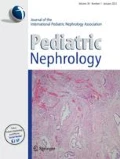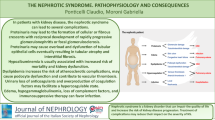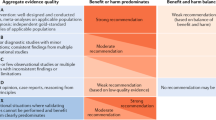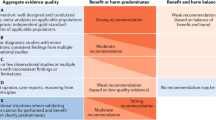Abstract
The clinical outcome of patients with membranoproliferative glomerulonephritis (MPGN) varies, with some patients progressing to end-stage renal disease. The aim of this retrospective study was to analyze the initial clinical signs and laboratory test results associated with an MPGN prognosis. The study cohort consisted of 47 patients with idiopathic MPGN Type I treated at the National Institute of Pediatrics, Mexico City, between 1971 and 2001. The median follow-up was 3 years. The three different outcomes of interest were death, renal failure, and nephrotic syndrome. The patients’ ages ranged between 4 and 16 years. All patients had different degrees of proteinuria, hyperlipidemia, and microscopic/macroscopic hematuria, and 85.1% of them showed hypocomplementemia. Clinical outcomes varied, however, the most common was nephrotic syndrome, either alone or combined with other syndromes, which accounted for 74.5% of all cases. Fifteen patients died. Treatment with methylprednisolone improved the patient’s condition, while the use of chloroquine or cyclophosphamide worsened it. Twenty-two patients had some degree of renal failure; glomerular filtration rate (GFR) levels and albumin values were negatively associated to renal failure, while treatment with methylprednisolone decreased the probability of renal failure. Nephrotic syndrome persisted in 18 patients; hemolytic complement and hemoglobin values were negatively associated with nephrotic syndrome, while macroscopic hematuria was positively associated with it. Signs that suggested a poor prognosis during diagnosis were low GFR, low albumin, low hemolytic complement, and macroscopic hematuria. Treatment with methylprednisolone seemed to improve prognosis, however, this needs to be confirmed with randomized studies.



Similar content being viewed by others
References
Milford DV, Mathieson PW (1999) Membranoproliferative glomerulonephritis. In: Barrat TM, Avner ED, Harmon WE (eds) Pediatric nephrology, 4th edn. Lippincott Williams & Wilkins, New York, pp 707–71
Nakopoulou L (2001) Membranoproliferative glomerulonephritis. Nephrol Dial Transplant 16[Suppl 6]:71–73
Licht C, Schlötzer-Schrehardt U, Kirschfink M, Zipfel PF, Hoppe B (2007) MPGN II–genetically determined by defective complement regulation? Pediatr Nephrol 22:2–9
Schwertz R, Rother U, Anders D, Gretz N, Schärer K, Kirschfink M (2001) Complement analysis in children with idiopathic membranoproliferative glomerulonephritis: A long-term follow-up. Pediatr Allergy Immunol 12:166–172
Rivera F, López-Gómez JM, Pérez-García R, Spanish Registry of Glomerulonephritis (2002) Frequency of renal pathology in Spain 1994–1999. Nephrol Dial Transplant 17:1594–1602
Rennke HG (1996) Secondary membranoproliferative glomerulonephritis. Kidney Int 47:643–656
Cueto-Manzano AM, Poo JL, Gamboa-Domínguez A, Quintanilla-Martínez L, Larriva-Sahd J, Correa-Rotter R (1995) Hepatitis C virus infection and membranoproliferative glomerulonephritis. Rev Invest Clin 47:189–196
Arslan S, Saatci U, Ozen S, Bakkaloglu A, Besbas N, Tinaztepe K, Hayran M (1997) Membranoproliferative glomerulonephritis in childhood: factors affecting prognosis. Int Urol Nephrol 29:711–716
McEnery PT (1990) Membranoproliferative glomerulonephritis: The Cincinnati experience—cumulative renal survival from 1957 to 1989. J Pediatr 116:S109–S114
Cansick JC, Lennon R, Cummins CL, Howie AJ, McGraw ME, Saleem MA, Tizard EJ, Hulton SA, Milford DV, Taylor CM (2004) Prognosis, treatment and outcome of childhood mesangiocapillary (membranoproliferative) glomerulonephritis. Nephrol Dial Transplant 19:2769–2777
Vikse BE, Bostad L, Aasarod K, Lysebo DE, Iversen BM (2002) Prognostic factors in mesangioproliferative glomerulonephritis. Nephrol Dial Transplant 17:1603–1613
Schwartz GJ, Haycock GB, Edelmann CM, Spitzer A (1976) A simple estimate of glomerular filtration rate in children derived from body length and plasma creatinine. Pediatrics 58:259–263
National High Blood Pressure Education Program Working Group on High Blood Pressure in Children and Adolescents (2004) The fourth report on the diagnosis, evaluation and treatment of high blood pressure in children and adolescents. Pediatrics 114:555–576
Kawasaki Y, Susuki J, Nosawa R, Susuki H (2002) Efficacy of school urinary screening for membranoproliferative glomerulonephritis type I. Arch Dis Child 86:21–25
West CD (1992) Idiopathic membranoproliferative glomerulonephritis in childhood. Pediatr Nephrol 6:96–103
Levin A (1999) Management of membranoproliferative glomerulonephritis: evidence-based recommendations. Kidney Int Suppl 70:S41–S46
Faedda R, Satta A, Tanda F, Pirisi M, Bartola E (1994) Immunosuppressive treatment of membranoproliferative glomerulonephritis. Nephron 67:59–65
Emre S, Sirin A, Alpay H, Tanman F, Uvsal V, Navir A, Bilge I (1995) Pulse methylprednisolone therapy in children with membranoproliferative glomerulonephritis. Acta Paediatr Jpn 37:626–629
Takeda A, Niimura F, Matsutani H (1995) Long-term corticosteroid and dipyridamole treatment of membranoproliferative glomerulonephritis type I in children. Nippon Jinzo Gakkai Shi 37:330–335
Bergstein JM, Andreoli SP (1995) Response of type I membranoproliferative glomerulonephritis to pulse methylprednisolone and alternate-day prednisone therapy. Pediatr Nephrol 9:268–271
Bahat E, Akkaya BK, Akman S, Karpusoglu G, Guven AG (2007) Comparison of pulse and oral steroid in childhood membranoproliferative glomerulonephritis. J Nephrol 20:234–245
Author information
Authors and Affiliations
Corresponding author
Rights and permissions
About this article
Cite this article
García-de la Puente, S., Orozco-Loza, I.L., Zaltzman-Girshevich, S. et al. Prognostic factors in children with membranoproliferative glomerulonephritis type I. Pediatr Nephrol 23, 929–935 (2008). https://doi.org/10.1007/s00467-008-0754-9
Received:
Revised:
Accepted:
Published:
Issue Date:
DOI: https://doi.org/10.1007/s00467-008-0754-9




